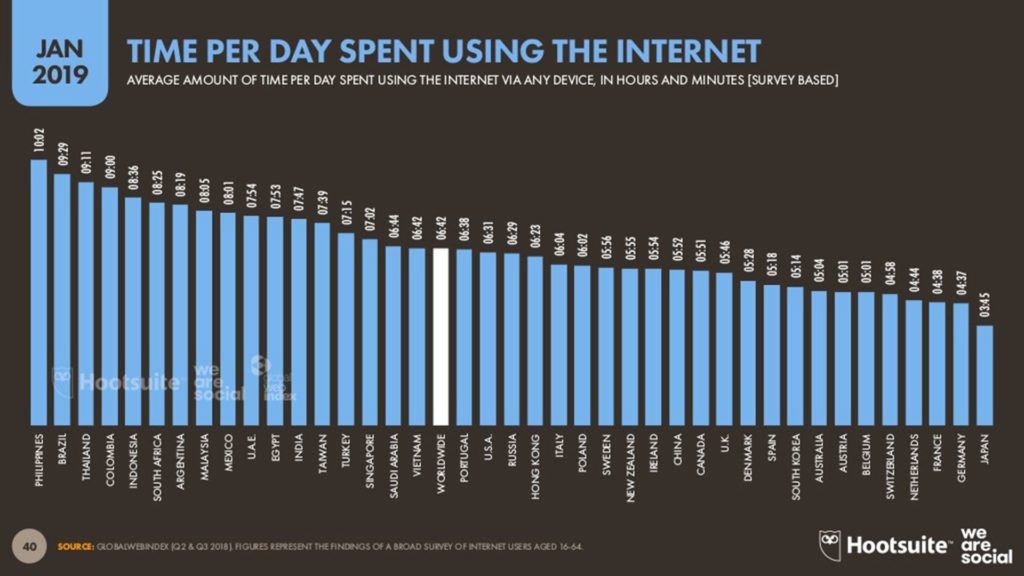In a 2019 study released by HootSuite and We Are Social it was estimated that the world’s digital community would spend a combined total of more than 1.2 billion years using the internet over the calendar year.
In the same report, detailing our online habits, it was found that the Philippines ranked number one in the world for internet usage. Averaging 10 hours and 2 minutes of screen time each and every day, Filipinos’ dependence on being connected to the internet is clear.

Examining these figures in a business context raises the question of how improvement to a company’s internet connection would affect business productivity?
Employees are online 10 hours of the day and a fast and stable internet connection is likely to play an important if not fundamental, role in their productivity. Although these 10 hours of internet usage are unlikely to all be job-related, for a traditional 8 hour working day, it is fair to say that most of this use is reliant on a business internet provider.
How Low-Quality Internet Can Impact Your Business
Regardless of the size of your organization, if you experience patchy or low-quality internet, the productivity of your business can suffer and you risk being at a disadvantage to your competition. Here are three key reasons why a stable internet connection could be important for your business:
- Reaching and connecting with new and existing customers can be negatively impacted by a low-quality internet connection. Particularly relevant for businesses that use video conferencing, or VoIP (i.e. call centers and BOPs) where fast and stable internet is essential, low-quality internet can result in high latency, disrupting the flow of your conversations, irritating the customer and wasting valuable time and perhaps sales.
- Employees flourish with a fast internet connection. If you are constantly faced with slow internet speeds or experience internet outages, your employees can become frustrated with long waiting times to download files and load web pages. As a result, your business may see reduced productivity and potentially a drop in employee motivation and efficiency in the office.
- Nearly 70% of enterprise organizations are moving business-critical applications to the cloud, which requires a stable and high-speed internet connection to take full advantage of. This includes cloud-based email systems, browser-based CRMs, and other SaaS (Software-as-a-Service) platforms. All of these cloud-based applications are negatively impacted by a poor internet connection with employees experiencing long delays or wait times and potentially unable to access core business systems at all.
How much does it really cost my business if the internet goes down?
To put the loss of productivity that can come as a result of not having a stable internet connection into perspective it is useful to work through the following (simplistic) example:
- Assume your business experiences an internet outage for the duration of 1 hour over the course of a day and all employees rely on a high-speed internet connection to carry out their work.
- If your business has 100 employees working during an internet outage, with each employee on an average salary of $5/hr, 1 hour of downtime would cost your business $500 in wages (100 employees x $5 = $500).
- Additionally, if each of these employees generates or contributes to $500 in sales or new value each day, an hour of downtime could result in your business losing out on $6,250 in value (($500 sales per employee / 8 hours office time each day) x 100 employees).
- Adding up the wage costs for unproductive employees, plus the loss in sales or new value generation, the total cost to this 100 staff business for 1 hour of downtime is $6,750 per hour ($500 + $6,250). That is a big unnecessary cost to any business!
- The return to full capacity also takes time, meaning that even if an outage is fixed within an hour, returning to the usual working conditions can add another half an hour on top of this.
Despite being a very simplistic example, you can see how the cost of internet downtime can quickly add up. It should also be noted that this downtime could potentially damage the reputation of the business, particularly for those in regular contact with clients.
One study found that 98% of participating organizations reported a single hour of downtime costing over $100,000, with 33% of the same sample of enterprises declaring that one hour of downtime costs their business somewhere between $1-5 million.
To mitigate the issues associated with downtime or patchy internet service, investing in a high-quality business internet service can often lead to numerous operational advantages for businesses.

Advantages of High-Quality Internet for Business
Upgrading to a high-quality internet circuit will result in increased performance and business productivity. Here are a few of the advantages often associated with upgrading your business to a high-quality internet connection:
- Lower latency than satellite or mobile connections;
- Upload and download speeds being substantially faster;
- Higher reliability in terms of uptimes and access to core business systems that rely on cloud-based applications;
- Clearer calls and video conferences with fewer disruptions caused by packet loss or jitter;
- Uncapped upload and download data rates with dedicated capacity;
- Availability of higher bandwidth plans;
- Dedicated and direct expert support network ensuring your business can resolve internet issues quickly and efficiently.
How Do I Choose a Top Quality Business Internet Provider?
As this article has discussed, investing in a top-quality business internet circuit should be a high priority for any organization that relies on the internet to operate. But what actually goes into ‘top quality internet’ and how do you find an internet provider that is suitable for your business in the Philippines?
To answer these questions, RISE will be releasing a series of blog articles that will discuss the various factors impacting the quality of your internet, as well as describing how the internet works in general. While price point is always going to be a factor that businesses will consider when choosing an internet service provider, there are other important considerations that should be included in your decision making.
Such factors include:
- How an internet service provider connects with other networks to transmit your traffic;
- Latency, or the measure of time it takes for your data to travel to its destination and back;
- Connection to numerous undersea cables in the Philippines to ensure stability and redundancy of the network across islands;
- International connectivity and how ISP’s build their connectivity across the world with the use of transit partners and internet exchanges;
- The Service Level Agreement (SLA), explaining the level of commitment of an ISP.
The blog series will culminate with part 7, where we will summarise these important factors and analyze the top priorities to keep in mind when choosing a top-quality business internet provider in the Philippines.



